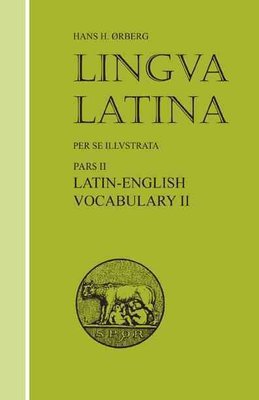

Remember that at one time all manner of people learned and spoke Latin: slaves, foreigners, statesman, plebs, etc. Despite its reputation and popular sentiment to the contrary, Latin is not any 'harder' or more complex than English or whatever other language one might be native to. Most student's trouble when learning Latin is the result of imperfectly knowing a) the vocab, and b) grammatical endings, constructions, etc. You will never, never achieve any degree of proficiency with the language if you don't work at it I recommend (and regularly use) a flashcard program (Anki in my case) for vocab, forms, names, whatever. The Lingua Latina books can help supplement one's reading, particularly with the graded difficulty approach that they are designed around.Ī final bit of advice: memorize everything. The canned readings in Wheelock's are okay, but none are longer than a few pages, at the most. Since the bulk of extant Latin literature is 'high' literature, attempting to read even so-called 'easy' authors such as Caesar can be incredibly frustrating to a novice, as even these authors were writing in a style that was the result of years of intensive rhetorical schooling. With a purely textual language like Latin, one can't easily use daily conversation (or 'immersion' in the current pedagogical lingo) as a means of reinforcement, and thus reading great quantities of text is the only way to improve one's comprehension. Really, the major problem for any Latin student-or student of any language, really-is gaining proficiency in the language via an inventory of vocabulary, grammatical structures, idioms, etc. However, once you get beyond the first few units, I would warmly recommend something like the Lingua Latina series, which not only is written entirely in Latin (with a graded difficulty curve as you advance), but also gives a nice in-situ introduction to Roman family life, civic institutions, etc. I hope this helps! If you'll have any questions on the material, redditors on /r/latin are very nice and are always willing to help.Īny of the basic primers (with the exception of the Oxford Latin Course) are probably fine, though Wheelock's is the time-tested standard for many Classics programs.

There is a Lingua Latina deck available for anki, divided into chapters: thus you can easily add words into your flashcard pool after completing every LL chapter.
#Lingua latina per se illustrata wikipedia software#
I used anki, a spaced repetition software based on flashcards, to study words. Some students find Lingua Latina's method to be sufficient for spaced repetition of new words, but it wasn't enough for me. Latine Disco and Neumann's companion are useful companions, which will help you understand grammar introduced in each chapter of Lingua Latina (you only need one of them).įinally, memorizing words is necessary with any language, and Latin is no exception. I would recommend not just filling the gaps in, but writing whole exercises out in a separate notebook - making the mechanical memory help you memorize words and grammatical structures.

Excercitia Latina, which follow Lingua Latina chapter by chapter, will give you enough practice to get a firm grip on each chapter's material. All of them can be bought on amazon, or acquired by other means if you wish to cut your costs. While Lingua Latina is a great textbook, I would advise getting some supplements to augment your studying process. You can understand it easily, and you've already learned 4 words! To give you an idea, its first sentence is "Rōma in Italiā est". It's based on the natural method: it is written completely in Latin, beginning with very simple phrases which speaker of any European language can understand, and slowly progresses further. Lingua Latina, on the other hand, focuses on reading comprehension and is considered by /r/latin users to be a superior learning method. It focuses on rote memorization of grammar. It seems to be a consensus at /r/latin that Wheelock's, while being a good textbook, teaches to translate, not to read. Firstly, it's not going to be very easy, but it will be a lot of fun - learning Latin will teach you a lot about linguistics, history, and even English. Hi! It's great that you want to learn Latin yourself - I was in a similar position not long ago, and can share my experience.


 0 kommentar(er)
0 kommentar(er)
